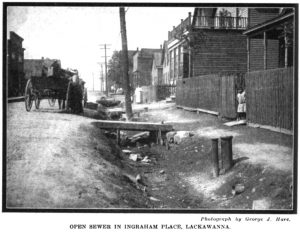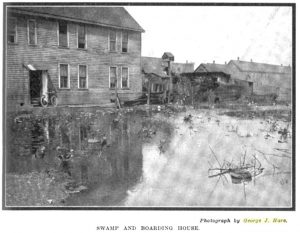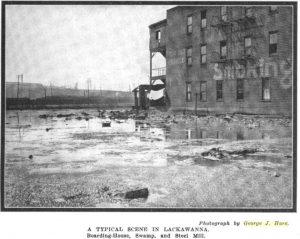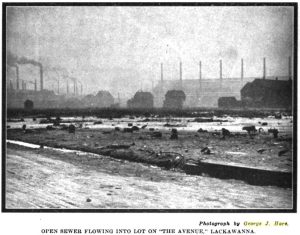Recently, the Buffalore group on Facebook posted vintage photographs of Lackawanna, NY showing the poverty conditions, squalor, and filth that people lived with in that city in the late 19th, and early 20th century. Lackawanna was mostly an immigrant city where people labored through inhumane working conditions, and a toxic environment surrounded by the steel industry that grew on the shores of Lake Erie. The city was lined with open sewers where waste, and pollutants flowed, or didn't, into open, stagnant swamp plains. Where narrow raised walkways kept people from walking through pools of their own waste, and filth. Collapsing buildings where businesses still resided, and shanty houses were people found shelter made up a sizable percentage of the structures within Lackawanna.
 I remember my grandmother telling stories of what it was like growing up in, and living in Bethlehem Park, just off of Route 5 now, across the highway from where the steel plants used to churn out pollutants all day, every day. This was during the decades leading up to the Great Depression. The roaring twenties are remembered as a decade opulence, prosperity, the beginning of women being liberated, wild club parties, upbeat jazz music, and carefree attitudes. But in the 1920s, my grandmother was a child living in an impoverished American city. She would retell stories of days, and weeks during that time when you couldn't go outside, or open the windows to your house in stifling summer heat. Black soot would rain down on the neighborhoods, coating everything until the weather changed, the winds shifted, and a blessing of rain would sweep through to wash some of it away. The air would be acrid, and toxic. The stench of the factories made it uncomfortable to breathe. Families, again, mostly immigrant families would be packed into the old century houses, sometimes three to four people per bedroom, with others sleeping in the living room, or the basement. That was the roaring twenties for much of America.
I remember my grandmother telling stories of what it was like growing up in, and living in Bethlehem Park, just off of Route 5 now, across the highway from where the steel plants used to churn out pollutants all day, every day. This was during the decades leading up to the Great Depression. The roaring twenties are remembered as a decade opulence, prosperity, the beginning of women being liberated, wild club parties, upbeat jazz music, and carefree attitudes. But in the 1920s, my grandmother was a child living in an impoverished American city. She would retell stories of days, and weeks during that time when you couldn't go outside, or open the windows to your house in stifling summer heat. Black soot would rain down on the neighborhoods, coating everything until the weather changed, the winds shifted, and a blessing of rain would sweep through to wash some of it away. The air would be acrid, and toxic. The stench of the factories made it uncomfortable to breathe. Families, again, mostly immigrant families would be packed into the old century houses, sometimes three to four people per bedroom, with others sleeping in the living room, or the basement. That was the roaring twenties for much of America.
It is here where my grandmother met my grandfather, who was a rail engineer at Bethlehem Steel. His family saved up their money, and for around $5500, they purchased an old 26 acre farm on the far eastern side of Lackawanna, far enough to be away from the black soot, and mechanical churning of the plants, but not so far that when the wind blew off the lake, they weren't affected by the unpleasantness of the industrial stench.
My grandmother's family immigrated to America from Italy in the early 20th century to escape the government instability, and growing fascism. My grandfather's family immigrated from Hungary around the same time, for much the same reasons. They settled in Lackawanna like so many others, but because transportation wasn't as available as it is today, or even became just a couple decades later, settling close to where the work could be found was their best option.
grandfather's family immigrated from Hungary around the same time, for much the same reasons. They settled in Lackawanna like so many others, but because transportation wasn't as available as it is today, or even became just a couple decades later, settling close to where the work could be found was their best option.
Things improved for them once they moved to their farm, but their stories were still dotted with tales of strange illnesses individuals in the family barely survived throughout the years. My grandfather was drafted into WWII, although he was in his 30's, and older than the standard draft range, the army needed skilled workers, such as rail engineers, to operate the trains in the European theater to move supplies near the front lines. He survived the war, at times, barely. He retold a tale of the Germans sending an unmanned locomotive engine down the rails at his oncoming train. He, and his crew barely escaped. He spent months in infirmary with his injuries before being sent back to the front lines. His locomotive division rolled into Berlin shortly after the collapse, and surrender of Germany. He survived the harrowing transport back home across a stormy ocean on a packed naval transport. His family waited for his arrival at Buffalo's palatial central terminal.
 I'm digressing. This wasn't meant to be a story about my family, but it illustrates the point I want to make.
I'm digressing. This wasn't meant to be a story about my family, but it illustrates the point I want to make.
People look at the past, and long for the good-ol' days. We romanticize what used to be, focusing on only the good, and forgetting how much was bad, or even worse than bad. We look at our present, and we focus on the bad, and what we want to change, then dream of a future that is only good, not imagining the negative consequences of what we're doing today, or the struggles that changes might bring.
We say, "Things weren't like this back in my day," but odds are, they were. And if you're being honest, chances are, a lot of things were actually worse.
People don't have less of a respect for life today - mass shootings, and the brutality we see every day isn't a function merely of a change of attitude toward what life is worth. Were we as a species really respecting, and valuing life when we were burning witches for baseless religious accusations? How about when indigenous peoples were being slaughtered? Gladiator tournaments? Hangings? Beheadings? Crucifixions? Monarchs ordering executions on a whim? Do these all show how we respected life? Are the 2A gun nuts really showing a respect for life by fighting harder for their right to own military grade weapons than seeking to find solutions that would stem the tides of gun related deaths we have in our nation?
Or even on a more basic level; is our next generation really the doom of the planet because of the technology they've adapted to, or how they use it? Or how they've adjusted to a broken economy that leaves them behind, when our past was filled with images such as the ones included here? Technology that created environmental destruction on a global scale that no one thought twice about because there was money to be made? Is that attitude any different than what we see today from profiteering capitalists, and climate change deniers?
Our problems today are much the same as they were, and ever have been. The good old days were selectively good, and certainly not for people of all  races, creeds, religions, ethnic groups, sexual orientations, or even professions. We're still debating on how we should protect our own environment. Australia is a tinderbox that is raining soot, and ash on the Earth, not much differently than the factories, and steel mills of the industrial revolutions. The ignorance of our past still haunts us today, and is compounded by the willful ignorance of our present, and Australia is an example of just that. Going back to the past won't make us better . Using what the past has taught us - the real lessons, good, and bad - to create a better future is what we need.
races, creeds, religions, ethnic groups, sexual orientations, or even professions. We're still debating on how we should protect our own environment. Australia is a tinderbox that is raining soot, and ash on the Earth, not much differently than the factories, and steel mills of the industrial revolutions. The ignorance of our past still haunts us today, and is compounded by the willful ignorance of our present, and Australia is an example of just that. Going back to the past won't make us better . Using what the past has taught us - the real lessons, good, and bad - to create a better future is what we need.
Thank you to Richard Sullivan for posting these images.
It is crazy, looking at these photos, and thinking, this is the Lackawanna my grandparents grew up in. Not even two full generations before me, and this Buffalo suburb that was once the heart of the local economy was nothing more than factories, and a swap, where people lived in third-world conditions.
The Weight
I don't even know. Haven't visited my scale or the gym in a long time. I'm not overly worried. I'm thinking fasting February, and getting back to the gym, maybe even a personal trainer soon, to get back on track.